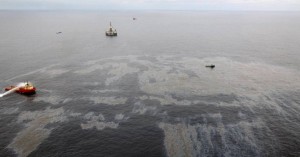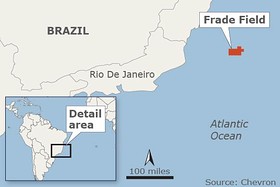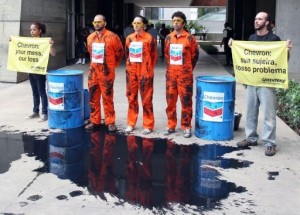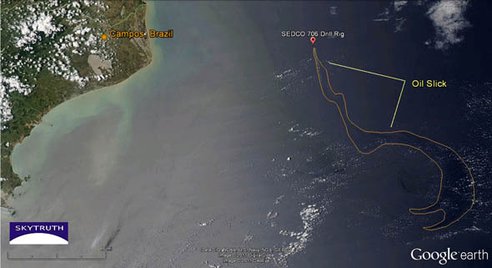
Update 12/14/11 06:42PM PST: This is huge: Brazil is suing Chevron and Transocean for $11 billion over their “lack of planning and environmental management.” The suit also seeks to suspend the companies from operating in the country. Brazilian officials obviously meant it when they vowed not to let Chevron get away with its environmental crimes:
Brazilian prosecutors sued Chevron Corp, the No. 2 U.S. oil company, and top offshore oil rig operator Transocean Ltd for 20 billion reais ($10.6 billion) over their alleged roles in a November oil spill near Rio de Janeiro.
The civil suit filed by federal prosecutors in Rio de Janeiro state also seeks to suspend the companies from operating in Brazil, the prosecutor’s office said in a statement on its website on Wednesday, a move that could halt operations of the 10 Transocean offshore drilling rigs operating in the country.
“During investigations the prosecutors found that Chevron and Transocean were not capable of controlling the damages caused by the leakage,” the statement said. “This is evidence of a lack of planning and environmental management by the companies.”
Update 12/14/11 04:00PM PST: Despite what you may have heard: No, Chevron has not stopped the oil leaking from its well off the coast of Brazil yet.
Update 12/12/11 09:34AM PST: Brazilian officials are not satisfied that Chevron has effectively stopped the oil leak from Frade well:
Chevron Corp., the second-largest U.S. oil company, may need to drill a relief well at its $3.6 billion Frade project in deep water off Brazil’s coast as part of measures to counter a spill.
The cementing at the Frade well that leaked last month currently “doesn’t guarantee 100 percent efficiency,” Magda Chambriard, a director at the regulator known as ANP, told reporters today in Rio de Janeiro. Drilling a relief well is “one possibility” if Chevron doesn’t convince ANP that the cementing is solidly stuck to the ground, Chambriard said.
A decision on the cementing may be reached as early as next week, Chambriard said.
Chevron may have to pay as much as 350 million reais ($193.5 million) in fines and damages for the Nov. 7 leak of at least 2,400 barrels of crude at the Frade project off the coast of Rio de Janeiro.
Update 12/09/11 12:00PM PST:Newspaper Folha de Sao Paulo has quoted Magda Chambriard, a director at the Brazil’s National Petroleum Agency (ANP), as saying the agency has identified 10 different infractions by Chevron in connection with the oil spill.
Update 12/03/11 01:01PM PST: Brazilian officials keep ratcheting up the rhetoric, now threatening to kick Chevron out altogether if it doesn’t fully clean up after itself. Millions of dollars in fines are not much of a punishment to a company that makes about $100 million a day, but being kicked out of Brazil would certainly be a serious blow. There’s a reason Chevron has spent close to $4 billion on its operations there, after all. Brazil’s offshore oil deposits are expected to be a significant source of growth for the entire oil industry in coming decades.
Update 11/25/11 01:27PM PST: Brazil has suspended all of Chevron’s offshore drilling activities while it investigates the companies “negligent” practices and seeks to hold those responsible accountable. Al Jazeera reports:
Brazil’s National Petroleum Agency said it decided to halt Chevron’s drilling rights after determining that there was evidence that the company had been “negligent” in its study of data needed to drill and in contingency planning for abandoning the well in the event of accident.
The agency, known as ANP, also rejected a request from Chevron to drill deeper wells into subsalt areas in the Frade field where the spill took place.
ANP said Chevron Brazil’s activities were to be suspended until “the cause and those responsible for the spill have been identified and safety conditions have been restored in the area”. …
The US company has already been fined $28m by Brazil’s environmental agency for the spill, an amount that is likely to rise as high as $145m when the ANP and Rio’s state government slap fines on the company, as they have pledged to do.
Anyone familiar with the ongoing battle to bring Chevron to justice in Ecuador knows that the company will do everything it can to protect its profits even at the expense of the planet and human health. That’s why it’s so reassuring to see Brazilian officials being so aggressive in holding Chevron responsible. Let Brazilian officials know you’ve got their back as they seek to hold serial polluter Chevron responsible for its environmental crimes.
Update 11/21/11 12:00PM PST: Well here’s something we didn’t even think the company knew how to do: Chevron has officially taken the blame and accepted responsibility for the oil spill off the coast of Brazil.
It’s very likely a strategic move on Chevron’s part, given the things Brazilian officials have been saying about the company’s response to the spill. All of Chevron’s attempts to deflect blame and criticism have failed, and the company must calculate that it’s time to pretend to show some contrition.
Brazil’s National Petroleum Agency says it’s possible that more than 110,000 gallons of oil have spilled into the Atlantic Ocean. Environment Minister Izabella Teixeira announced that Chevron faces at least $28 million in fines, and possibly several more of similar size as more infractions are uncovered. Here’s a roundup of what else Brazilian officials have been saying about holding Chevron accountable:
“We’re going to show this gang that they can’t come here and create whatever environmental mess they want. I want to see the CEO of Chevron swim in that oil.” – Carlos Minc, Rio de Janeiro state environment minister
“There is no doubt that a crime occurred. The spill comes from the drilling activity. What interests me now is to find who is responsible.” – Fabio Scliar, head of the Federal Police department’s environmental affairs division
“We believe the accident could’ve been avoided. There was an environmental crime. They hid information and their emergency team took almost 10 days to start acting.” – Carlos Minc
Some officials have also been pointing out how unprepared Chevron was to deal with an oil spill. Brazil’s state-owned oil company, Petrobras, had to alert Chevron to the existence of the spill in the first place. Worse, Chevron had to borrow sonar equipment from Petrobras to determine the exact location of the spill. “The fact that Chevron had to borrow the equipment also shows that it was unprepared to respond to an emergency,” Fabio Scliar says.
No wonder Chevron has decided it’s time to be proactive about actually taking responsibility.
Update 11/20/11 02:45PM PST: Chevron continues its efforts to protect itself first and foremost. Brazil’s Federal Police are reportedly investigating claims that Chevron is using a technique called sandblasting to disperse the oil, which would minimize the appearance of oil on the surface of the ocean but endanger marine life.
Brazil’s Federal Police will investigate claims made by State Environment Secretary Carlos Minc, who has accused oil company Chevron of implementing an illegal sandblasting technique to deal with the slick caused by a recent leak in deep-water oil fields off the Rio de Janeiro coastline….
If the accusations are proven, the U.S. oil giant could face environment crimes charges, which could lead to the company being banned from bidding for contracts for the vast “pre-salt” reserves, and even prison sentences of up to four years, Brazilian media reports….
Another police investigation is already underway into the causes of the incident.
The sandblasting technique can seriously affect marine life as, when mixed with the sand, the oil drops to the seafloor.
If these charges are true, it would be the latest in a string of duplicitous actions taken by Chevron since the spill was first reported. Initially, Chevron claimed the oil spill was the result of natural seepage, not its drilling operations, prompting Brazilian officials to publicly confirm that the spill was Chevron’s fault. Later, Brazil’s Federal Police said that Chevron had violated the terms of its drilling license. Throughout this ordeal, Chevron has drastically understated the size of the spill and overstated the extent of its response.
Update 11/18/11 04:32PM PST: Brazilian officials are now reporting that as much as 2,600 barrels may have leaked into the Atlantic as a result of Chevron’s spill. An official with Brazil’s Federal Police is also saying that Chevron apparently violated the terms of its drilling permit. According to the AP:
Nearly 110,000 gallons of oil may have spilled into the Atlantic Ocean because of a leak at an offshore Chevron drilling site, Brazil’s environmental protection agency said Friday.
Officials think between 8,400 to 13,800 gallons of oil leaked each day from Nov. 8 through Tuesday, Ibama said in a statement on its website. Chevron had said that only 16,800 to 27,300 gallons in total leaked into the ocean.
Officials are still investigating the cause of the leak, which has been almost entirely contained, but the Ibama statement said it was a result of drilling.
An official at Brazil’s Federal Police, which has opened an investigation into the spill, said Chevron “drilled about 500 meters (1,640 feet) farther than they were licensed to do.” The official, who agreed to discuss the matter only if not quoted by name, said that information came from a person with knowledge of the drilling.
The leak occurred at a drilling site about 230 miles (370 kilometers) northeast of Rio de Janeiro.
Rio state Environment Minister Carlos Minc said earlier he was sure the leak was larger than Chevron estimated and he called for more transparency from the company.
“We can’t trivialize this,” he told the Globo TV network. “It’s really serious and we don’t yet know all the consequences.”
Marine life in the area of the spill will be affected by the leak, Minc said, adding that whales are migrating from north to south through the spill area.
The oil slick, which was moving away from the coast, grew to 11 miles (18 kilometers), Ibama said. Most of the oil was concentrated around the drilling rig in a layer about 3 feet (1 meter) thick.
Update 11/18/11 09:07AM PST: More reports are surfacing of Chevron attempting to deceive Brazilian officials and the public about the extent of its oil spill off the coast of Rio de Janeiro.
Chevron has claimed that somewhere between 400 and 650 barrels of oil has been spilled, and that the leak is contained. But Ana Carolina Oliveira, a spokeswoman for Brazil’s oil regulator, the National Petroleum Agency, told the Associated Press that an estimated 1,000 barrels had leaked to the surface and that it was still unclear if the leak was contained. And as the San Francisco Chronicle reports, satellite imagery shows that the oil spill extends some 918 square miles across the surface of the ocean, leading SkyTruth, a nonprofit that specializes in using satellite imagery to assess environmental problems, to theorize that the spill rate as of Tuesday might have been up to 3,738 barrels per day — almost 10 times what Chevron is reporting.
Here’s the map put together by SkyTruth:
Brazilian officials reiterated that Chevron could face severe penalties as a result of this spill and its insufficient response: “If Chevron is not doing what it should (to contain the spill) it will be severely punished,” Mines and Energy Minister Edison Lobao said Thursday.
Taken together with the fact that Chevron’s claim that it has 18 ships on hand to clean up the spill was directly contradicted by Brazil’s Federal Police agency, which did a flyover of the area and only observed 1 ship doing cleanup, it seems Chevron is in full disaster containment mode — that is, containment of the public relations disaster. As usual, Chevron is placing public perception and how that might affect its future operations and profits above the health of the planet.
It’s easy to see why: The drilling contractor for Chevron’s Frade oil well, which is the source of the spill, is none other than Transocean, the company that actually owned the drilling rig that exploded and sank in April 2010, causing BP’s Deepwater Horizon disaster. Chevron is probably desperately trying to fend off anyone making that connection. But as DeSmog Blog’s Farron Cousins points out, the similarities are just too eerie to ignore.
Update 11/17/11 10:22AM PST: Brazil’s Federal Police agency has announced that it is investigating the spill, and said in a statement that those responsible could be facing up to 5 years in prison.
According to CNN, Chevron has been fairly duplicitous in reporting the extent of the leak and its response:
Chevron told [Brazil’s Oil and Gas Regulator (ANP)] that 18 vessels were on the scene to take care of the clean-up. But according to the Folha de Sao Paulo newspaper, Federal Police did a fly-over of the site Tuesday and saw only one vessel.
“The reports do not correspond with the reality of the facts,” Fabio Scliar, from the police environment department, told Folha de Sao Paulo. “I want to understand what happened.”ANP said the spill is dispersing and moving away from the Brazilian coast, so it does not appear to threaten Rio’s world-famous beaches. But it does raise questions about how prepared Brazil is for the development of its offshore “pre-salt” deposits, which are expected to turn the country into a major oil exporter in the coming years.
Original Post: After Chevron tried to blame it on natural seepage for a week, officials have confirmed that the oil spill off the Brazilian coast is in fact the result of Chevron’s operations at its Frade well.
 Of course, attempting to minimize the damage of its operations in an effort to evade responsibility is nothing new for Chevron. I probably don’t need to even type the word Ecuador here, because you’re probably already thinking it, too.
Of course, attempting to minimize the damage of its operations in an effort to evade responsibility is nothing new for Chevron. I probably don’t need to even type the word Ecuador here, because you’re probably already thinking it, too.
Every single oil spill Chevron is responsible for but tries to downplay should be a cause of deep concern to all rational human beings on this planet. Chevron is attempting to expand operations everywhere from the Gulf of Mexico to Kurdistan. If you think Chevron would take any more responsibility for an oil spill in the Gulf than it has for its 18 billion gallons of toxic oil waste in the Ecuadorean Amazon, you’re fooling yourself.
To illustrate my point: Chevron has invested $43 billion in its liquid natural gas project, called Gorgon, on Barrow Island off the Western coast of Australia. Environmentalists in Australia were horrified when the project was proposed and protested vigorously to stop Chevron from being allowed to move forward with it, their main argument being that Barrow Island is home to a number of threatened animal species and even several that exist only that island.
It will come as no surprise to anyone familiar with Chevron’s typical mode of operations that over 1,550 of these rare and threatened animals have been killed so far by the company’s operations. And that’s just what the company has officially reported. But don’t worry, a Chevron spokesman assures us that the company has “a range of measures in place to limit the impact of construction activities on the environment, including lowering speed limits to 40km/h during dusk and dawn when the animals are most active.” Doesn’t do much for all the dead animals, but isn’t it reassuring to know that Chevron is at least pretending to care?
I guess we should be somewhat impressed that Chevron isn’t trying to deny that it’s killing these animals the way it tried to deny it was at fault for the oil slick off Brazil’s coast. The fact that Chevron initially tried to say it wasn’t at fault just shows that the company is determined to never take responsibility for the impacts of its business operations and will use any means necessary to evade cleaning up after itself, just like in Ecuador.

So the question becomes: How much longer are countries around the world going to let this rapacious, greedy company enter their borders in its unending quest for profit? An Australian reporter already asked a Chevron spokesmanstraight up, “Why should we trust you?” How many more countries will ask the same exact question when Chevron comes knocking?
Seems like that’s a question Chevron management needs to be asking themselves, too — but somehow I get the feeling their too busy counting their fat stacks of obscene profits instead.
